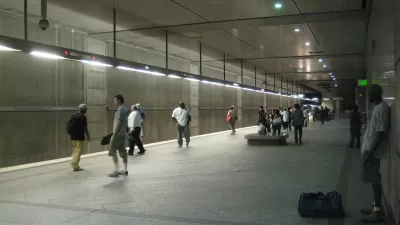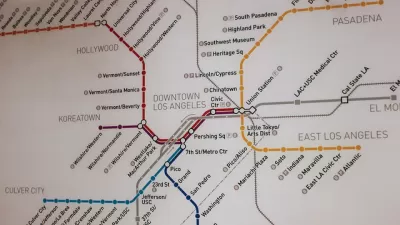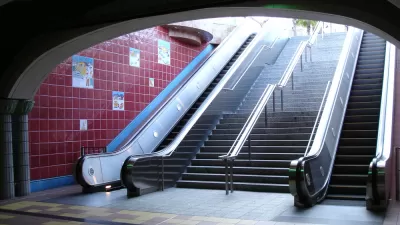Los Angeles will receive its largest-ever federal grant, $1.25 billion, to help fund the Purple Line subway, aka the "Subway to the Sea." Also on its way is an $856 million loan from the TIFIA program.

"A major federal grant of $1.25 billion to extend the 'Subway to the Sea' was received by local officials Wednesday as part of an overall $2.1 billion package made possible by voter approval of the half-cent sales tax in Measure R," reports Rick Orlov.
Funding acquired by the Los Angeles County Metropolitan Transportation Authority (Metro) earlier this week also includes an $856-million low-interest loan for the project, which will extend the existing Purple Line. The loan was made possible by the local sales tax approved by Measure R in 2008 and an America Fast Forward, TIFIA-backed loan. The loan will serve as a local match for the grant, according to Orlov.
For the record, "Subway to the Sea" is a misnomer—left-over from earlier marketing pitches for the line. According to the current plan for the subway, the route would end at the Veterans Administration campus in West Los Angeles.
Steve Hymon also reports on Metro's recent windfall, including additional details about the federal funding acquired for the Purple Line and the Regional Connector.
According to Hymon, the $1.2 billion grant will come from the New Starts program, while the "$856-million loan is coming from the TIFIA program that helps provide low-interest loans backed by the federal government to build new infrastructure; TIFIA helps reduce interest costs."
This is Metro's second big funding win of the year. In February, Metro "secured a $670-million New Starts grant and $160-million TIFIA loan…to help fund construction of the Regional Connector, a 1.9-mile underground light rail line that will connect the Blue Line, Expo Line and Gold Line in downtown Los Angeles to speed trips throughout the county and to downtown."
FULL STORY: Los Angeles officials laud $1.25 billion federal grant for Purple Line

Planetizen Federal Action Tracker
A weekly monitor of how Trump’s orders and actions are impacting planners and planning in America.

Restaurant Patios Were a Pandemic Win — Why Were They so Hard to Keep?
Social distancing requirements and changes in travel patterns prompted cities to pilot new uses for street and sidewalk space. Then it got complicated.

Map: Where Senate Republicans Want to Sell Your Public Lands
For public land advocates, the Senate Republicans’ proposal to sell millions of acres of public land in the West is “the biggest fight of their careers.”

Maui's Vacation Rental Debate Turns Ugly
Verbal attacks, misinformation campaigns and fistfights plague a high-stakes debate to convert thousands of vacation rentals into long-term housing.

San Francisco Suspends Traffic Calming Amidst Record Deaths
Citing “a challenging fiscal landscape,” the city will cease the program on the heels of 42 traffic deaths, including 24 pedestrians.

California Homeless Arrests, Citations Spike After Ruling
An investigation reveals that anti-homeless actions increased up to 500% after Grants Pass v. Johnson — even in cities claiming no policy change.
Urban Design for Planners 1: Software Tools
This six-course series explores essential urban design concepts using open source software and equips planners with the tools they need to participate fully in the urban design process.
Planning for Universal Design
Learn the tools for implementing Universal Design in planning regulations.
Heyer Gruel & Associates PA
JM Goldson LLC
Custer County Colorado
City of Camden Redevelopment Agency
City of Astoria
Transportation Research & Education Center (TREC) at Portland State University
Camden Redevelopment Agency
City of Claremont
Municipality of Princeton (NJ)





























